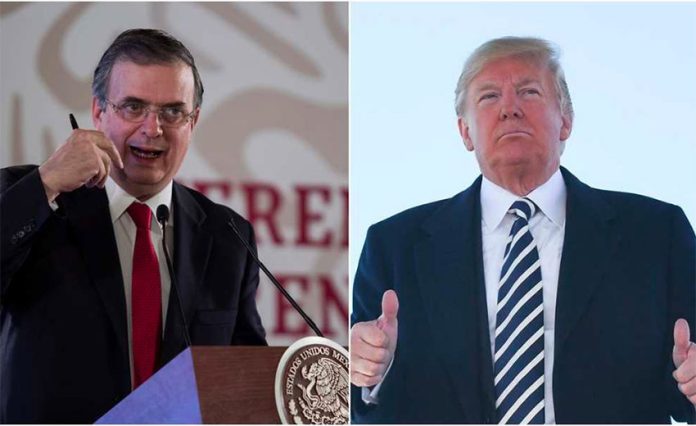Mexico has responded to a threat from United States President Donald Trump to cut off financial aid if it doesn’t do more to stop drug trafficking by asserting that the production, transport and distribution of narcotics is a regional problem.
In a presidential memorandum released by the White House on Thursday night, Trump said the Mexican government needs to ramp up efforts to eradicate opium poppies, intercept illicit drugs and prosecute and seize the assets of traffickers.
“. . . Mexico needs to do more to stop the deadly flow of drugs entering our country,” he wrote, declaring that included the development of “a comprehensive drug control strategy.”
“. . . Mexico’s full cooperation is essential to reduce heroin production and confront illicit fentanyl production and every form of drug trafficking, including through United States ports of entry.”
If Trump is unable to certify that Mexico is doing more to combat the drug trade, the United States government could withhold financial assistance to Mexico and block international development bank loans.
In Thursday’s memorandum, the U.S. president made such a ruling for Bolivia and Venezuela, which he said had “failed demonstrably” during the past 12 months to uphold their anti-drug commitments.
“Without further progress over the coming year, I will consider determining that Mexico has failed demonstrably to uphold its international drug control commitments,” Trump wrote.
Mexico’s Secretariat of Foreign Affairs (SRE) responded to Trump’s memorandum in a statement published yesterday.
“The production, transport and distribution of narcotics . . . by transnational organized crime networks, as well as the associated violence, represent a regional problem, whose attention requires the collaboration and coordinated efforts of the governments in the region,” the SRE said.
The foreign ministry defended Mexico’s efforts to combat the drug trade, stating that the country “has made efforts to combat the production and trafficking of drugs in its territory, often with a very high cost in human and financial terms.”
The SRE charged that the trafficking of drugs and associated violence is fueled by the high levels of drug consumption.
“Drug use reduction goals are not always met by the countries in the region,” the SRE said, making a thinly veiled reference to the United States, the world’s largest market for narcotics.
“In our own case, the new federal administration of Mexico is promoting strong prevention campaigns aimed at dissuading [drug] use among the young population,” the statement said.
The SRE expressed its concern about the “massive” amount of firearms that are smuggled into Mexico from the United States, pointing out that it has been proven that guns sourced from the U.S. are used in thousands of murders every year.
It said that the illegal drug trade is supported by millions of dollars that are laundered in “the financial systems of the countries in the region” and therefore “a comprehensive solution to the cancer of drug trafficking” also requires a joint effort to “prevent and penalize money laundering.”
The statement concluded by saying that Mexico remains committed to continuing cooperating with other countries in the region to combat the production and trafficking of narcotics.
Christopher Wilson, deputy director at the Wilson Center’s Mexico Institute, said the warning from Trump is “something that has to be taken seriously, but still it is truly unlikely that it would actually occur.”
He added that United States financial assistance to Mexico isn’t significant considering the size of the Mexican economy, asserting that what’s more important is bilateral cooperation on law enforcement issues.
“It is unclear if that is truly at risk, but that would be very negative to the interests of both United States and Mexico,” Wilson said.
Since Mexico agreed to increase enforcement against undocumented migrants as part of a deal with the United States that ended Trump’s threat to impose tariffs on all Mexican goods, the Mexican government has received almost no criticism from its United States counterpart and some praise.
Trump said on July 1 that Mexico is doing a “great job” in stemming illegal migration as more than 20,000 federal security force members patrolled both the southern and northern borders.
Even as he threatened to cut of financial aid if Mexico doesn’t do more to combat the illicit drug trade, the U.S. president acknowledged that many Mexican military and law enforcement professionals are already “bravely meeting this challenge and confronting the transnational criminal organizations that threaten both of our countries.”
Source: El Universal (sp), Associated Press (en)
